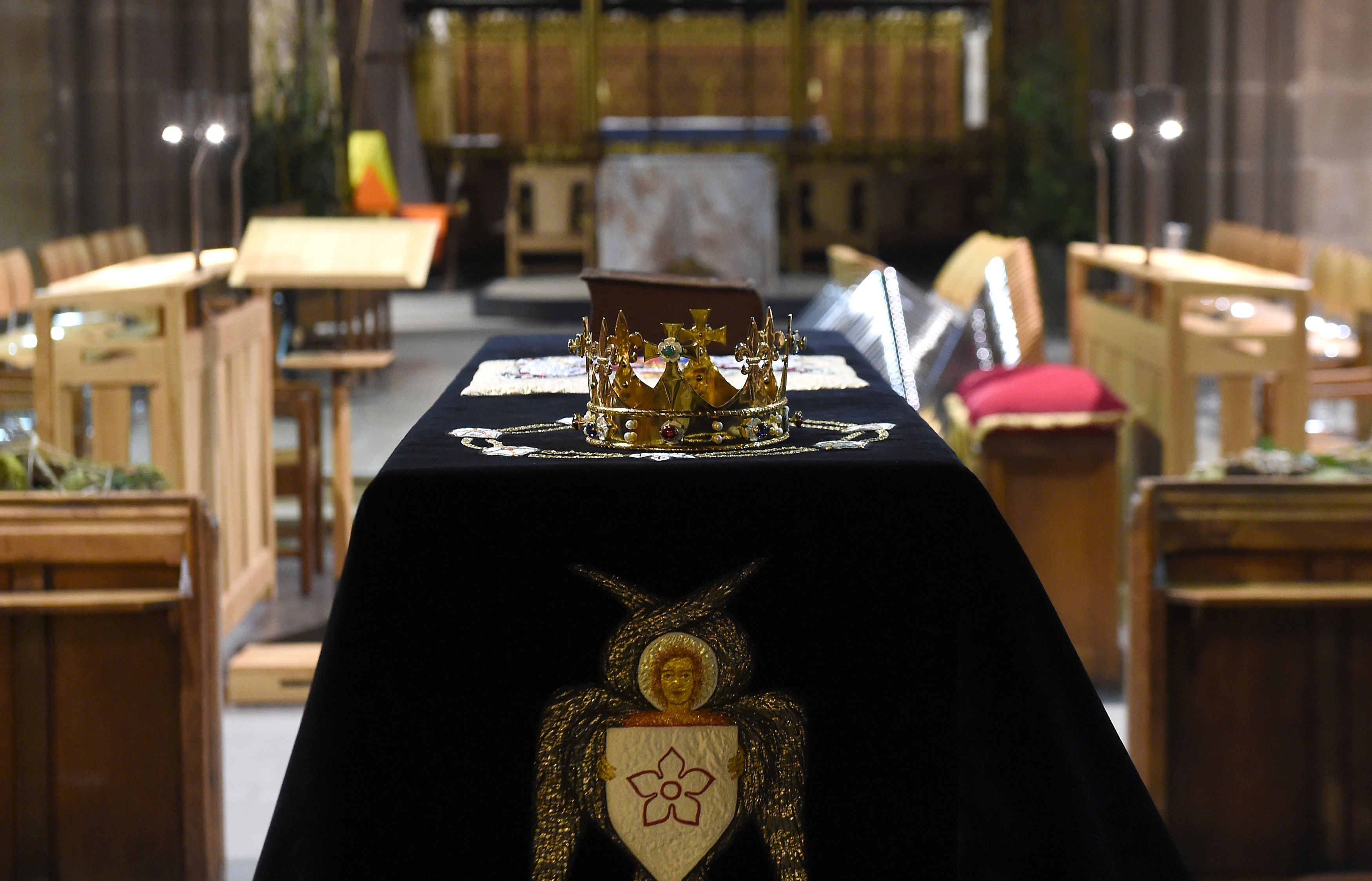Richard is Richard: Let’s not play heroes and villains with our history
written for The Spectator, 26 March 2015

King Richard’s coffin lies in Leicester Cathedral, on Sunday evening. Credit: PA
We should have known it. Today’s reburial isn’t about Richard III. It’s about Benedict Cumberbatch. Isn’t everything these days, somehow about Benedict Cumberbatch? I have a theory that he’s the one who really punched Oisin Tymon, and poor Clarkson is just taking the rap. Jeremy Clarkson, Richard III, both cruelly maligned blokes. They’ll be banning nepoticide at the BBC next.
But back to The Batch. An hour ago, Cumberbatch popped up as the star attraction at the Richard III’s reinternment at Leicester Cathedral, to read a poem newly written for the service by poet laureate Carol Anne Duffy. This whole affair is beginning to feel uncomfortably like a Narnia reenactment weekend, with Cumberbatch a slick Talking Otter amid the baubled knights in armour. The Batch, we are told, is King Richard’s second cousin sixteen times removed. As the University of Leicester’s geneticist Turi King points out, about seventeen million of us are even closer relatives, but since we’re all now experts on Plantagenet case law concerning agnatic primogeniture, perhaps someone’s found that Benedict has particular form of descent, like the seventh son of a seventh son, bestowing on him the ancient office of Lector Lutra at Royal Reinternments. Or perhaps he just has a better agent.
But incongruous as Cumberbatch’s appearance may be, Duffy’s poem is actually rather beautiful. We’d been told in advance that it would include the line, ‘Grant me the carving of my name’, and for many of Richard’s most dogged adherents, this week has been an opportunity to re-establish Richard’s good name, fixing in stone the foundations for a rehabilitation. Where Duffy’s poem is at its best, however, is where it cedes space to the shades of light and dark, the grey traces of historical memory, present glimpsing the past, past glimpsing the future, ‘as a king sees shadows on the battlefield’. Richard surely never imagined that he’d be identified by radiocarbon dating: ‘My bones, scripted in light, upon cold soil / a human Braille’, but he might have ‘dreamed of your future breath / in prayer for me’. It could have been no more clairvoyant than that, a dream of transient breath.
Duffy, at least, seems to understand what has been worrying historians about this week’s idolatry. For a week, debating Richard’s innocence of infanticide has become the stuff of Punch-and-Judy debate shows, David Starkey and Phillipa Langley insulting each other, attackbots multiplying on Twitter. ‘It would be great if we could get Henry VII to go through the same vilification he made Richard suffer’, said one Richard III Society member to me this week.
That’s never been the way history works. History allows us the distance to recognise that neither Henry nor Richard were clear-cut villains, nor freedom fighters, but ambitious men bound by the morals of their own time. (As Cumberbatch sheds tears for Richard today, I assume he doesn’t imagine his Plantagenet cousin would have supported his petition to posthumously quash Alan Turing’s conviction for homosexuality). The price we pay for that distance is that certainty almost becomes always impossible. We can never know for sure who murdered the princes in the Tower – like lawyers, historians can only build probable cases. Emotional distance makes this easier, and in turn it becomes bizarre to weep for long-dead monarchs.
If there’s a line in Duffy’s poem that makes me uneasy as a historian, it’s her shortest and simplest utterance, at the centre of the verse. ‘These relics, bless.’ If there have been moments this week that haven’t looked like anachronistic absurdities (a modern band for Richard III?) it’s because they’ve looked like far more serious relic veneration. The best thing Richard’s Tudor successors did for England was to ban us from the practice of keening, like shabby armchairs, rocking back and forth in front ancient relics. We’ve been slipping back into relic worship for a while – eBay does a roaring trade in them, and only last week, a vial of Winston Churchill’s blood, misappropriated fifty years ago by a nurse, was withdrawn from sale after an outcry. But as I have written before, we can’t let veneration, by a religion or just a slightly obsessive historical fan club, drown out the innate skepticism of historical inquiry. We’re moderns, not medievals.






